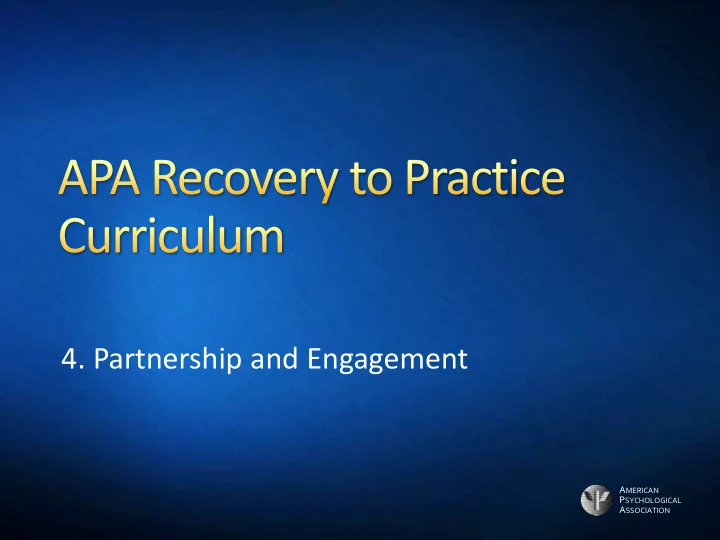

4. Partnership and Engagement A MERICAN P SYCHOLOGICAL A SSOCIATION
The Need to Engage People with Serious Mental Illnesses in the Service Delivery System Improve access to services Potential to minimize the effect of crises Potential to benefit from the expertise people have about the illness and need for services Potential therapeutic benefits Advantages of having people with lived experience involved with prioritizing and conducting research Benefits of involvement in staff selection and training A MERICAN P SYCHOLOGICAL A SSOCIATION
Reasons People are Reluctant to Engage the Mental Health System From the System Itself: Prior negative experiences and possible trauma From the Individual: Severity of illness Multiple social barriers: Poverty, homelessness, criminal history, ill physical health, social stigma, poor social skills, and social isolation. Need wide range of services A MERICAN P SYCHOLOGICAL A SSOCIATION
Historical and Cultural Barriers Immigrant Populations Language barriers Social stigma of Behavioral Health problems / Religious beliefs on the origin of mental illness Cultural beliefs and practices related to decision making Distrust of authority / Previous abuse from those in authority African Americans Distrust of authority and systems History of slavery and discrimination Poverty Poor education systems High incarceration rates for young males A MERICAN P SYCHOLOGICAL A SSOCIATION
Overcoming Barriers Through Assertive Outreach Components of Assertive Outreach Meeting the person on his or her own terms, including times and locations Offering a range of services, including crisis intervention Identified person available 24 hours per day Risk management approach that offers safety Pay attention to social factors Supported access to mainstream services Peer support and encouragement Offering daytime activities Treating persons as equals with dignity and respect Help with finance and benefits Finding suitable accommodations A MERICAN P SYCHOLOGICAL A SSOCIATION
Benefits of Partnering with People with Serious Mental Illnesses Minimizing the effects of crises Determining which services are best Potential therapeutic benefits Research participation A MERICAN P SYCHOLOGICAL A SSOCIATION
Challenges Cultural factors Lack o f services and resources for individuals Lack of system commitment Lack of training for psychologists and other professionals Threatening the expertise of psychologists A MERICAN P SYCHOLOGICAL A SSOCIATION
Citation for this Module: American Psychological Association & Jansen, M. A. (2014). Partnership and Engagement. Reframing Psychology for the Emerging Health Care Environment: Recovery Curriculum for People with Serious Mental Illnesses and Behavioral Health Disorders. Washington, DC: American Psychological Association. www.apa.org/pi/rtp Citation for the full Curriculum: American Psychological Association & Jansen, M. A. (2014). Reframing Psychology for the Emerging Health Care Environment: Recovery Curriculum for People with Serious Mental Illnesses and Behavioral Health Disorders. Washington, DC: American Psychological Association. mjansen@bayviewbehavioral.org or jansenm@shaw.ca A MERICAN August, 2014 P SYCHOLOGICAL A SSOCIATION
Recommend
More recommend